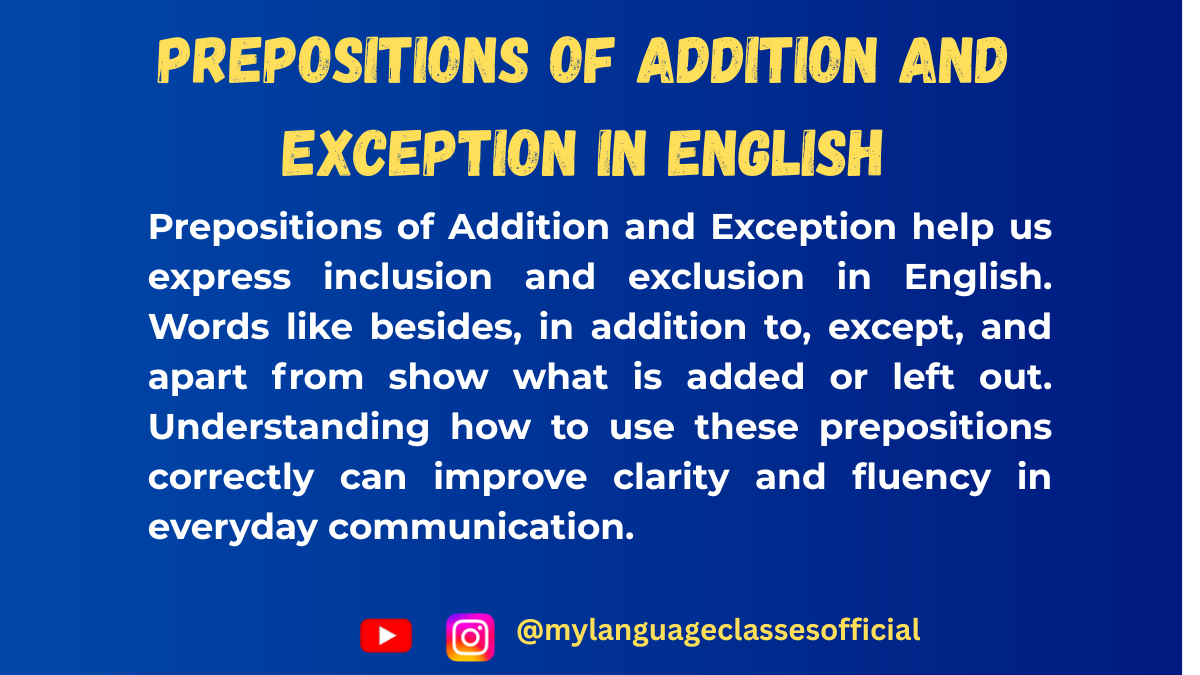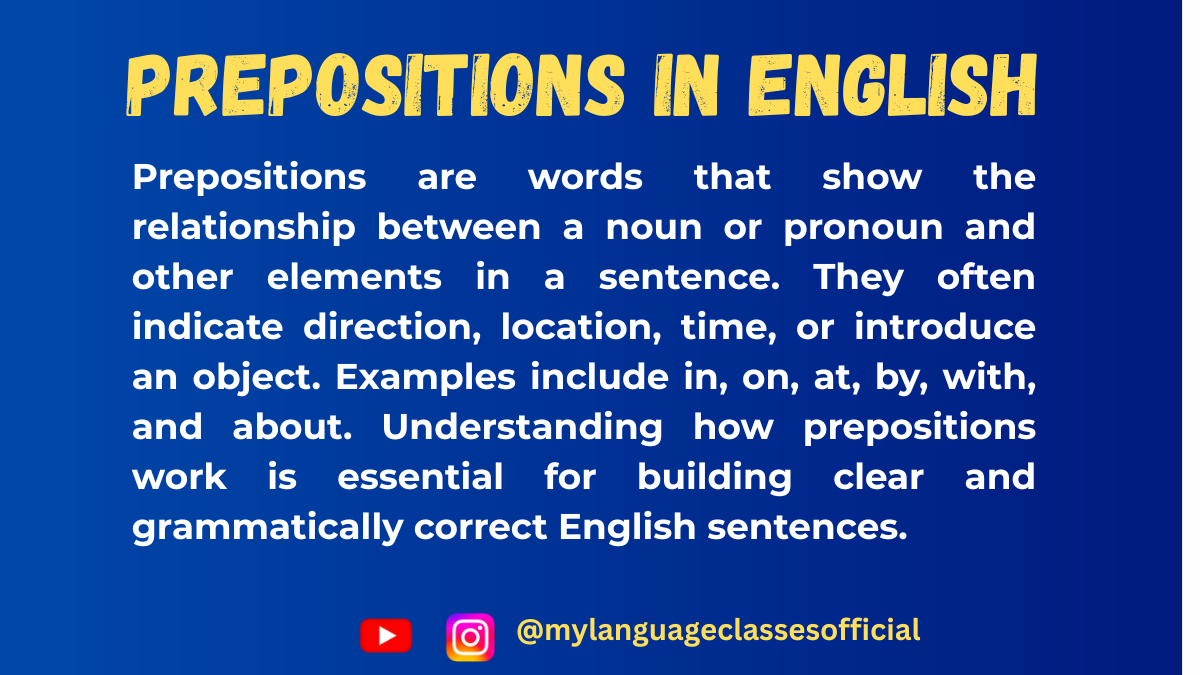Your cart is currently empty!
Tag: prepositions with examples
-
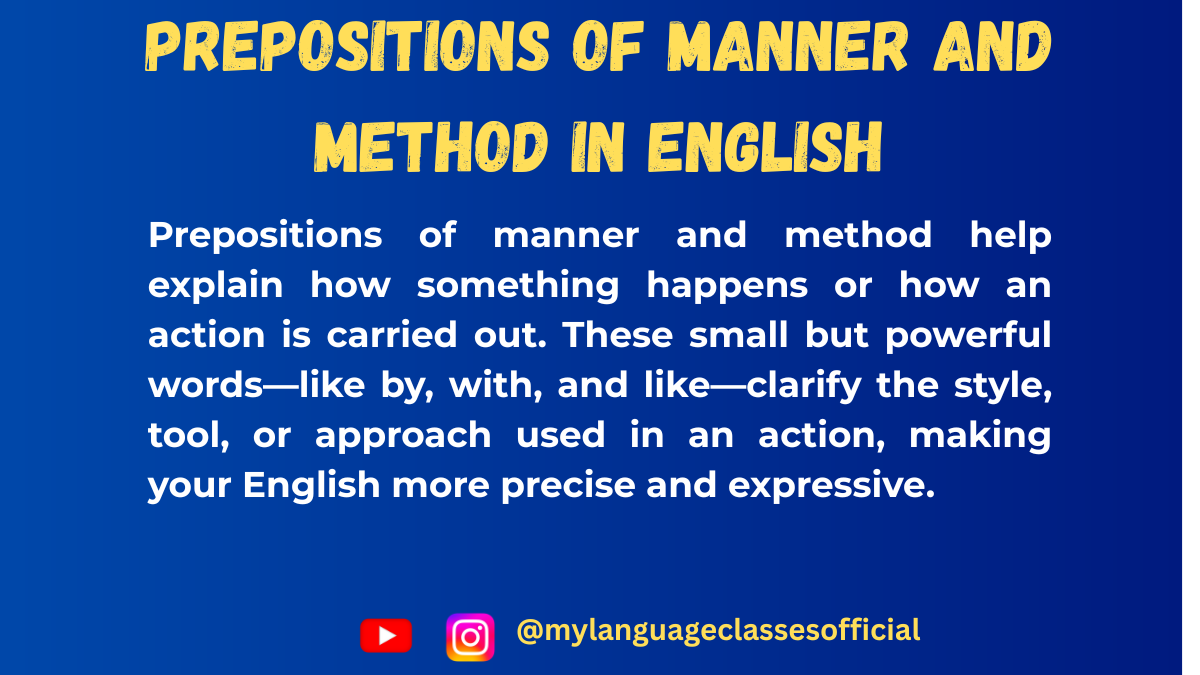
Preposition of Manner and Method in English
Prepositions play a crucial role in English grammar by linking words and phrases to express relationships. Among them, prepositions of manner and method describe how something happens or how an action is performed. Understanding these prepositions will help in constructing clear and precise sentences.
Usage of Prepositions of Manner and Method
Prepositions of manner and method are used to describe the way an action is carried out. They answer the question “How?” and provide clarity on the mode of an action. These prepositions are commonly used with verbs to indicate how something is done.
Situations Where Prepositions of Manner and Method Are Used:
- Describing Actions – How an action is performed (e.g., “She spoke with confidence.”)
- Means of Communication – How messages are conveyed (e.g., “I informed him by email.”)
- Transportation Methods – How a person travels (e.g., “He came by car.”)
- Instruments or Tools Used – What is used to perform an action (e.g., “He wrote with a pen.”)
- Style or Behavior – How someone behaves or reacts (e.g., “She acted in a rude manner.”)
- Work Process – How work is done (e.g., “The task was completed in a professional way.”)
- Payment Methods – How a transaction is made (e.g., “I paid by credit card.”)
- Languages Spoken – How something is expressed (e.g., “He explained it in Spanish.”)
- Order or Sequence – The manner in which events take place (e.g., “He explained step by step.”)
- Emotions or Attitude – The manner in which emotions are displayed (e.g., “She answered with a smile.”)
List of Prepositions of Manner and Method
Below is a table listing common prepositions of manner and method along with example sentences:
Preposition Example Sentence 1 Example Sentence 2 by She traveled by train. I sent the message by email. with He cut the paper with scissors. She painted the picture with a brush. in She spoke in a soft voice. He completed the work in a hurry. on They talked on the phone. He arrived on time. through He learned French through practice. She succeeded through hard work. via We will communicate via email. He sent the money via bank transfer. like She ran like the wind. He behaves like a child. as He worked as a manager. She acted as his assistant. using He repaired the machine using a tool. She solved the problem using logic. without She did it without hesitation. He left without saying goodbye.
More Example Sentences
- He performed the task with great skill.
- The letter was sent by post.
- She communicated via video call.
- He completed the test without any difficulty.
- She entered the room in a hurry.
- He fixed the issue using his knowledge.
- The news was delivered on the radio.
- The decision was made through consensus.
- She danced like a professional.
- The work was done in an efficient manner.
Fill in the Blanks
- He traveled to work ___ bus.
- She wrote the essay ___ a pen.
- The information was sent ___ email.
- He spoke ___ a soft voice.
- She completed the project ___ hard work.
- They communicated ___ phone.
- He handled the situation ___ patience.
- The machine was repaired ___ a screwdriver.
- The announcement was made ___ the radio.
- She left the meeting ___ saying a word.
Answers:
- by
- with
- by
- in
- through
- on
- with
- using
- on
- without
Things to Keep in Mind
- “By” is commonly used to indicate means of transport, communication, and payment.
- “With” is used for tools, instruments, and emotions.
- “In” is used for style, behavior, and emotions.
- “On” is used for communication and time.
- “Through” is used for processes and effort.
- “Via” is a more formal way to express routes or channels.
- “Like” and “as” should not be confused; “like” is used for comparisons, whereas “as” refers to roles or functions.
- “Using” highlights the method or tool employed.
- “Without” indicates absence or lack of something.
Conclusion
Prepositions of manner and method are essential for expressing the way an action is performed. They enhance clarity and precision in speech and writing. By understanding their correct usage, learners can improve their fluency and effectiveness in communication. Keep practicing, and soon, using these prepositions will become second nature!
If you enjoyed this lesson, be sure to check out more posts like this on my blog at My Language Classes. Don’t forget to subscribe my YouTube channel and follow me on Instagram for the latest language learning tips and lessons. Leave a comment below to share your thoughts, or ask any questions you have about nouns.
Happy learning! 😊
-
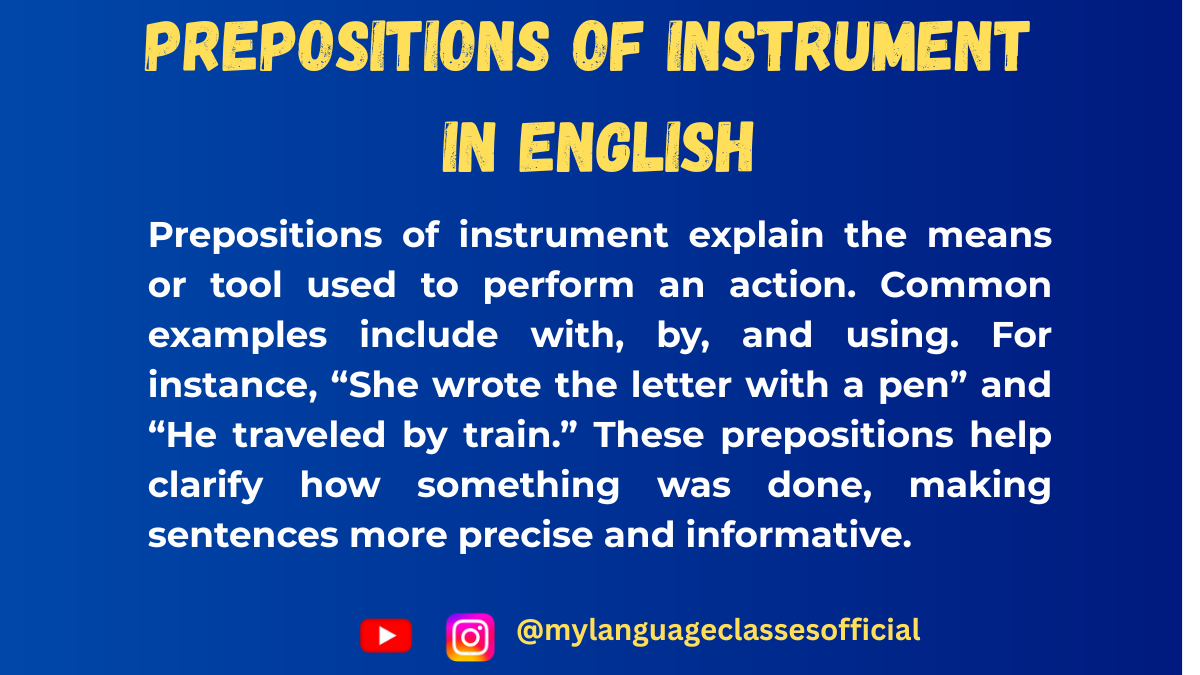
Prepositions of Instrument in English
Prepositions of instrument are used to indicate the means or tools used to perform an action. These prepositions show how something happens or is achieved. They are crucial in English grammar, as they help provide clarity in sentences.
Usage of Prepositions of Instrument
Prepositions of instrument are used in various situations, such as:
- With Tools or Instruments – Used when referring to a tool or instrument that helps complete an action.
- With Modes of Transport – Used when talking about how someone travels.
- With Means of Communication – Used when referring to ways of sending or receiving information.
- With Body Parts – Used when describing actions performed using body parts.
- With Natural Forces – Used when mentioning how something is affected by nature.
- With Materials or Substances – Used to describe the material used to create something.
- With Assistance – Used when referring to a person or thing that helps achieve something.
- With Measurement and Currency – Used when expressing amounts or ways of measuring.
List of Prepositions of Instrument
Preposition Example Sentence 1 Example Sentence 2 by She wrote the letter by hand. He traveled by car. with He cut the paper with scissors. She painted the wall with a brush. through They communicated through email. The water flows through the pipe. using He solved the problem using a calculator. She opened the door using a key. by means of The data was transferred by means of a USB drive. He escaped by means of a secret tunnel. via The message was sent via email. We traveled via London. on She swore on her mother’s life. He played a song on the piano. in The message was written in ink. She expressed her feelings in words. through the use of The document was signed through the use of an electronic pen. The problem was solved through the use of technology. by way of They reached the village by way of the river. He sent the package by way of courier.
More Example Sentences
- She cut the vegetables with a sharp knife.
- He sent me a message via WhatsApp.
- The report was written in pencil.
- We traveled to the city by train.
- He operates the machine using a remote control.
- She delivered the speech through a microphone.
- The bridge collapsed by means of an explosion.
- The poem was written on a piece of parchment.
- The artist sketched the portrait with charcoal.
- They recorded the lecture through the use of a digital recorder.
Fill in the Blanks
- He fixed the broken chair ___ a hammer.
- She traveled to Paris ___ plane.
- The students communicated ___ email.
- He ate the soup ___ a spoon.
- The announcement was made ___ a loudspeaker.
- The letter was written ___ a ballpoint pen.
- They cut the paper ___ scissors.
- The transaction was completed ___ an online payment system.
- The thief entered the house ___ a secret passage.
- The message was transmitted ___ radio waves.
Answers
- with
- by
- through
- with
- through
- in
- with
- using
- by means of
- via
Things to Keep in Mind
- Prepositions of instrument often indicate the method, means, or tools used to perform an action.
- Some prepositions, like by and with, are commonly interchangeable but depend on context.
- The choice of preposition can sometimes depend on the verb in the sentence.
- Articles (a, an, the) may be required before the instrument (e.g., “with a knife”).
- Gender does not play a role in English prepositions, unlike some other languages.
Conclusion
Prepositions of instrument are essential in English to convey how actions are performed. Understanding their correct usage will help improve clarity and precision in communication. By mastering these prepositions, learners can express themselves more effectively in various situations, whether discussing tools, travel, communication, or assistance.
If you enjoyed this lesson, be sure to check out more posts like this on my blog at My Language Classes. Don’t forget to subscribe my YouTube channel and follow me on Instagram for the latest language learning tips and lessons. Leave a comment below to share your thoughts, or ask any questions you have about nouns.
Happy learning! 😊
-
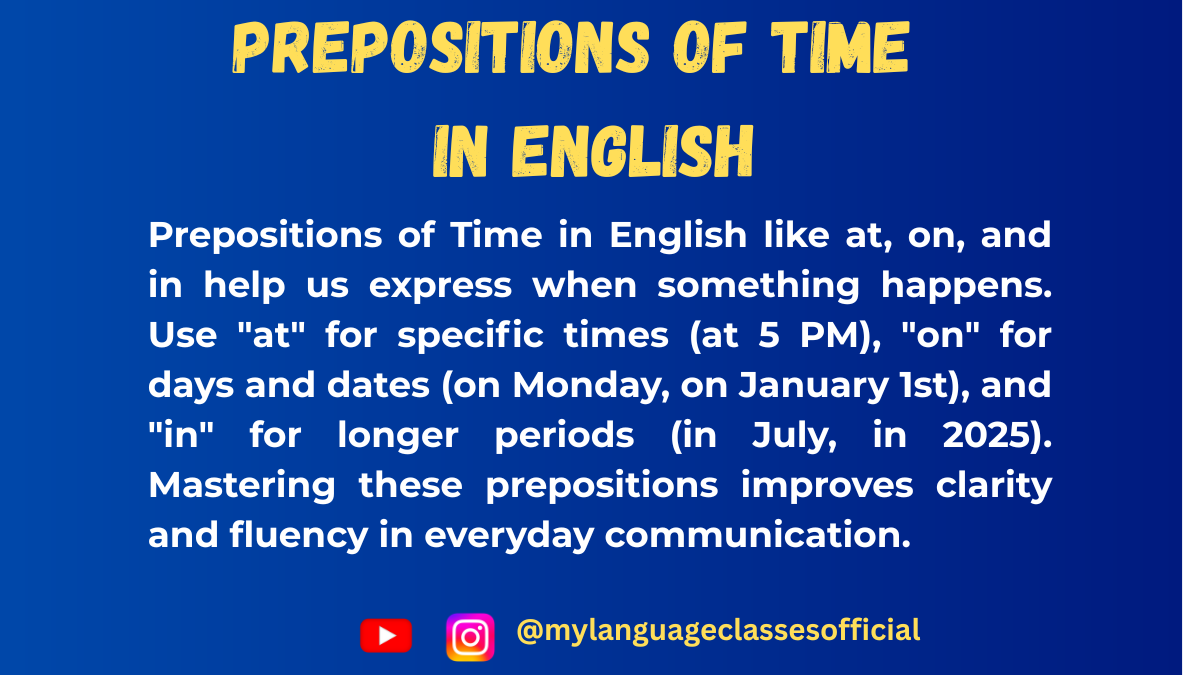
Prepositions of Time in English
Prepositions of time are essential in English grammar as they help us understand when an event occurs. They connect nouns or pronouns with time-related elements, clarifying specific moments, durations, or general time frames. In this blog, we will explore the different prepositions of time, their usages, examples, and important points to remember.
List of Prepositions of Time and Their Usage
Below is a list of common prepositions of time along with their specific usage and example sentences.
Preposition Usage Example Sentence 1 Example Sentence 2 At Specific time of the day, festivals, and specific points in time I wake up at 6 AM. We will meet at Christmas. On Specific days and dates I was born on Monday. The party is on 5th June. In Months, years, centuries, long periods I was born in December. We will visit Japan in 2025. By A deadline or before a certain time You must submit the report by Monday. She will be home by 7 PM. Before An event occurring earlier than a certain time Finish your work before sunset. He arrived before me. After An event occurring later than a certain time We will go out after lunch. She arrived after the meeting started. Since A point in time until now She has been here since morning. I have lived here since 2010. For Duration of time She stayed here for two weeks. I have known him for ten years. During Within a specific period He slept during the lecture. We traveled during the holidays. From…to A specific time range The shop is open from 9 AM to 5 PM. The movie runs from 6 PM to 8 PM. Until/till Up to a certain point in time Wait here until I return. The shop is open till midnight. Within Before the end of a specific period The work will be done within an hour. We will reach there within two days.
More Example Sentences
- She will call me at noon.
- The meeting is scheduled on Tuesday.
- We moved to this city in 2018.
- Complete your assignment by tomorrow.
- The baby slept before dinner.
- We will go out after the rain stops.
- She has lived here since 2015.
- He was on vacation for a month.
- The crowd cheered during the match.
- The library is open from 9 AM to 7 PM.
Things to Keep in Mind
- At is used for specific points in time, while on is for specific days and dates.
- In is used for months, years, centuries, and longer periods.
- Since refers to a specific point in time, while for is used for a duration.
- By means “no later than,” whereas before means “earlier than.”
- Until/till is used when something continues up to a point in time.
- From…to marks the beginning and end of a time period.
- During is used to indicate something happening within a specific period.
- Within suggests a task or event will occur before a given period ends.
Fill in the Blanks
- The train will arrive ___ 6 PM.
- She was born ___ March.
- We will go on a trip ___ summer vacation.
- He stayed in London ___ two years.
- You should submit the form ___ Monday.
- The lights went out ___ the movie.
- I have been waiting here ___ morning.
- We will complete the project ___ two weeks.
- They will be back home ___ midnight.
- The concert will be held ___ Friday night.
Answers
- at
- in
- during
- for
- by
- during
- since
- within
- at
- on
Conclusion
Understanding and correctly using prepositions of time is crucial for clear and precise communication. These prepositions help in framing accurate sentences, making conversations and writing more effective. By practicing their usage and remembering their specific contexts, you can enhance your command over the English language. Keep practicing, and soon, using prepositions of time will become second nature!
If you enjoyed this lesson, be sure to check out more posts like this on my blog at My Language Classes. Don’t forget to subscribe my YouTube channel and follow me on Instagram for the latest language learning tips and lessons. Leave a comment below to share your thoughts, or ask any questions you have about nouns.
Happy learning! 😊

